Unit 9 Can you come to my party?单词课件(共49张PPT)2023-2024学年人教新目标(Go for it)版英语八年级上册
文档属性
| 名称 | Unit 9 Can you come to my party?单词课件(共49张PPT)2023-2024学年人教新目标(Go for it)版英语八年级上册 | 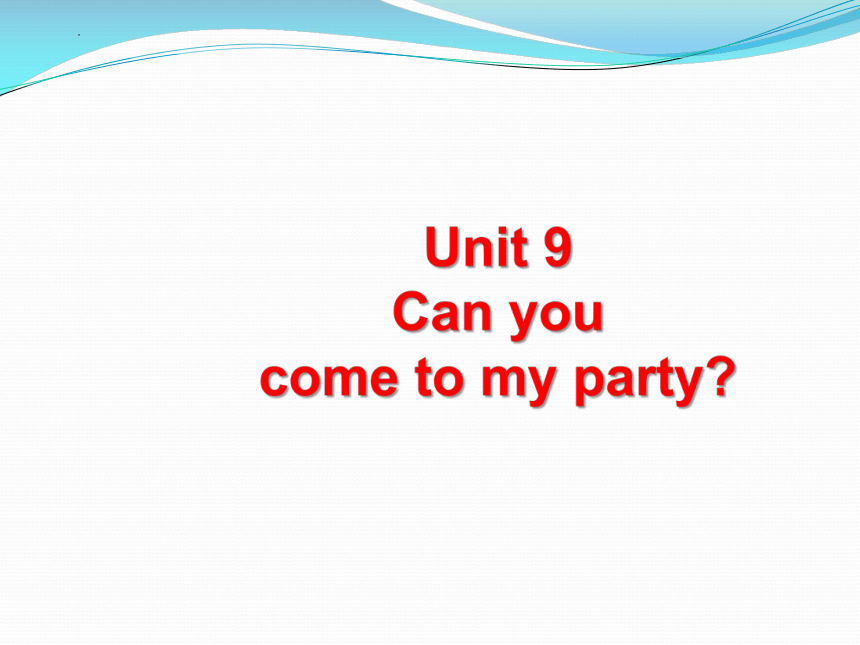 | |
| 格式 | pptx | ||
| 文件大小 | 1.8MB | ||
| 资源类型 | 教案 | ||
| 版本资源 | 人教新目标(Go for it)版 | ||
| 科目 | 英语 | ||
| 更新时间 | 2024-11-13 19:52:43 | ||
图片预览






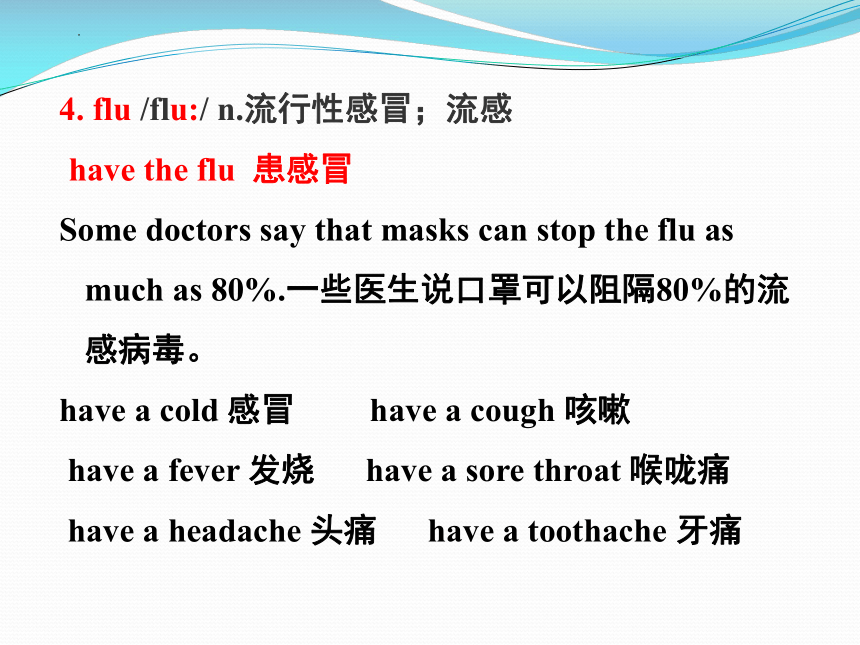

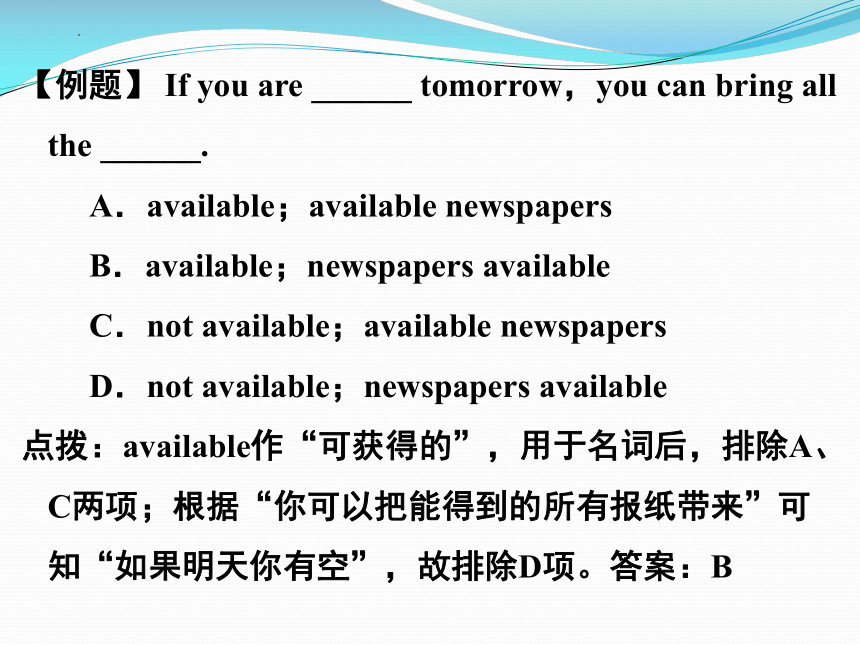
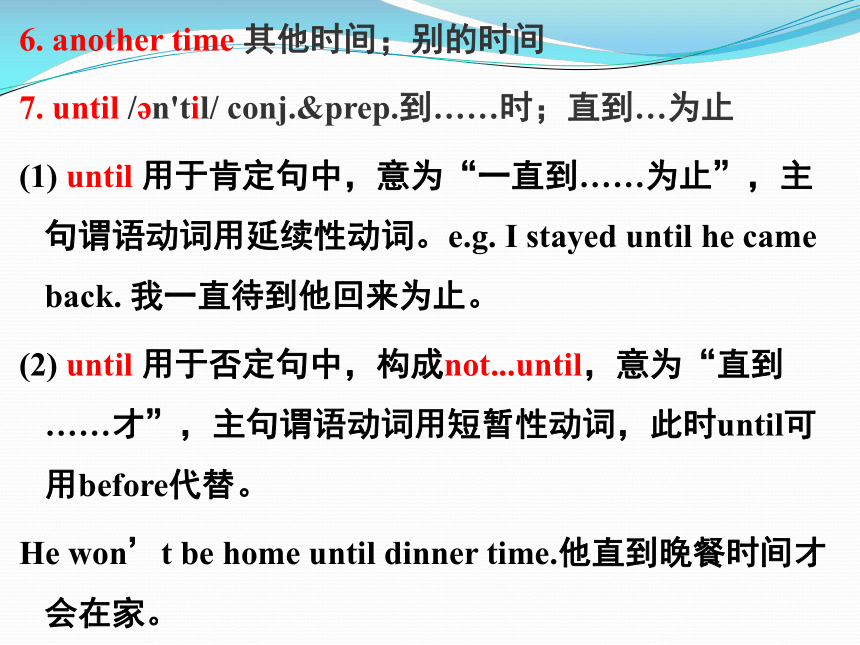

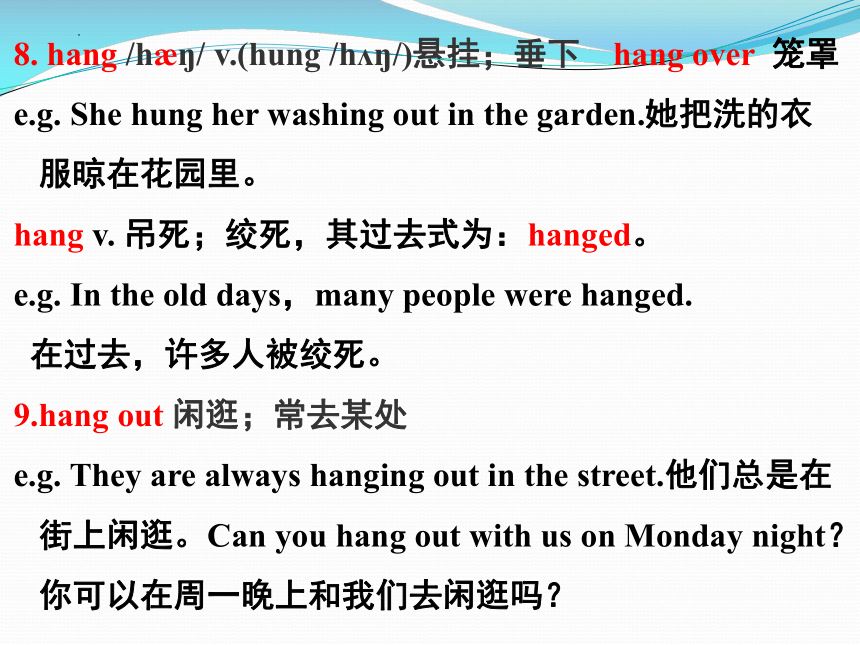
文档简介
(共49张PPT)
Unit 9
Can you
come to my party
1. prepare for 为…做准备相当于get ready for。
prepare oneself for sth 使某人为某事做好准备
I have to prepare for an exam.我必须准备考试。
prepare v. 使做好准备;把……准备好,其名词形式为:preparation 准备;准备工作
party preparations 聚会筹备工作
make preparations for... 为...做准备
e.g. The students are preparing for the coming sports meeting.=The students are getting ready for the coming sports meeting.
(2) prepare...for...为……准备……,=get ready for...。
e.g. Mother is preparing a birthday cake for my birthday.=Mother is getting a birthday cake ready for my birthday.妈妈正在为我的生日准备生日蛋糕。
(3) prepare to do sth.准备做某事=get ready to do sth.
e.g. You should prepare to have the P.E. lesson.
=You should get ready to have the P.E. lesson.
你应当准备上体育课。
prepare sb sth 给某人准备某物=preare sth for sb
【例1】 Tomorrow is Dragon Boat Day.My mother and my grandma ______a big meal for our family now.
A.are preparing B.be preparing
C.prepare D.prepared
点拨:根据时间状语now以及语意可知本句时态用现在进行时。主语My mother and my grandma是复数,故用are preparing。
答案:A
【例2】I'm very busy these days.Last week I ______the driving test.Now I'm ______take part in the coming sports meeting.
A.prepared;preparing B.prepared for;preparing
C.prepared for;preparing to D.prepared;preparing to
点拨:根据last week可知时态用一般过去时;为……做准备用prepare for,故A、D两项不符;prepare to do sth.意为“准备做某事”,故选C项。
答案:C
2. exam /iɡ'z m/ n.(=examination)考试
examine v. 测验
I’ve made a lot of mistakes in the exam.
我在试卷中犯了很多错误。
have/take an exam 参加考试
pass the exam 通过考试,考试及格
fail the exam 考试不及格
3. go to the doctor 去看医生=see a doctor
4. flu /flu:/ n.流行性感冒;流感
have the flu 患感冒
Some doctors say that masks can stop the flu as much as 80%.一些医生说口罩可以阻隔80%的流感病毒。
have a cold 感冒 have a cough 咳嗽
have a fever 发烧 have a sore throat 喉咙痛
have a headache 头痛 have a toothache 牙痛
5. available / 've l bl/ adj. 有空的;可获得的
(1) 作“有空的”时,相当于free,不用于名词前。
e.g. I'm available next Tuesday if you want to meet then.如果你想见面的话,我下星期二有空。
(2) 作“可获得的”时,常用于名词后。
e.g. I am going to send you all the stamps available.我将把我能得到的邮票给你寄去。
【例题】 If you are ______ tomorrow,you can bring all the ______.
A.available;available newspapers
B.available;newspapers available
C.not available;available newspapers
D.not available;newspapers available
点拨:available作“可获得的”,用于名词后,排除A、C两项;根据“你可以把能得到的所有报纸带来”可知“如果明天你有空”,故排除D项。答案:B
6. another time 其他时间;别的时间
7. until / n'til/ conj.&prep.到……时;直到…为止
(1) until 用于肯定句中,意为“一直到……为止”,主句谓语动词用延续性动词。e.g. I stayed until he came back. 我一直待到他回来为止。
(2) until 用于否定句中,构成not...until,意为“直到……才”,主句谓语动词用短暂性动词,此时until可用before代替。
He won’t be home until dinner time.他直到晚餐时间才会在家。
【例题】 Tony didn't feel better ______ he took some medicine.I guess he can go to school this afternoon.
A.until B.when
C.after D.because
点拨:not...until 意为“直到……才”,句意为“托尼直到吃了一些药才感觉好多了。我猜他今天下午就能去上学”。B、C、D三项放在句中不合句意。
答案:A
8. hang /h / v.(hung /h /)悬挂;垂下 hang over 笼罩
e.g. She hung her washing out in the garden.她把洗的衣服晾在花园里。
hang v. 吊死;绞死,其过去式为:hanged。
e.g. In the old days,many people were hanged.
在过去,许多人被绞死。
9.hang out 闲逛;常去某处
e.g. They are always hanging out in the street.他们总是在街上闲逛。Can you hang out with us on Monday night?你可以在周一晚上和我们去闲逛吗?
【例题】 He ______the basket on the wall after entering the room yesterday.
A.hang B.hangs
C.hung D.hanged
解析: 由yesterday知应用过去时,可排除A、B两项;hang 当“悬挂”讲时,过去式为hung,故排除D项。答案 C
句意 昨天他进屋后把篮子挂在了墙上。
10. catch /k t / v.及时赶上;接住 ;抓住 过去式为: caught catch up with 追上;赶上
Go on in front.I can soon catch up with you.
e.g. He caught my hand and held it.他抓住我的手握着。
catch you 再见=see you=goodbye
Catch you on Monday.周一见你们!
catch a cold 患感冒 catch a bus 赶上公交车
e.g. We caught the last bus.我们赶上了最后一班公共汽车。The birds can easily catch the fish for food.e.g.
【例题】 Now he's working hard ______up with his classmates.
A.catch B.catches
C.caught D.to catch
点拨:考查catch的不同形式。根据“现在他正努力学习”可知目的是为了“赶上他的同班同学”,动词不定式表目的,故选D项。
答案:D
11. invite / n'va t/ v.邀请 invitation n.邀请;请柬
invite sb.to sw.邀请某人去……
e.g. I'm going to invite my friends to my house this Sunday.
invite sb.to do sth.邀请某人做某事
e.g. The young man invited me to dance.这个年轻人邀请我去跳舞。
e.g. I got an invitation to dinner.我收到了晚宴的邀请。
【例题】I invited him ______ our school last year.
A.to visit B.visited
C.visiting D.visits
解析 invite sb.to do sth.意为“邀请某人做某事”,是固定短语。
答案 A
句意 去年我邀请他参观我们的学校。
12. accept / k'sept/ v.接受 acceptable
指同意或愿意接受。强调“收到”的结果“接受”了。
e.g. My friend invited me to the party,but I didn't accept it.我的朋友邀请我去参加宴会,但是我没有接受。
Never accept an invitation unless you really plan to go.
receive v.收到,指“接”“收”的动作或事实,并不包含接受者本人是否“接受”的意思。
e.g. I received a letter from my sister last week.
【例题】 I ______some gifts from my friends,but I didn't ______ them.
A.received;accept B.accepted;receive
C.receive;accept D.accept;receive
点拨:根据后面的一般过去时可知前半句也应是一般过去时,C、D两项错误;浏览题干可知句意为“我收到了来自朋友的礼物,但是我没有接受”,排除B项。
答案:A
13. refuse /r 'fju:z/ v.拒绝 名词形式为:refusal
refuse to do sth.拒绝做某事
refuse sb sth
e.g. You should refuse to smoke here.
在这儿你应该拒绝吸烟。
【例题】 根据汉语意思完成下句
不要拒绝我的邀请。______ ______ my invitation.
答案:Don't refuse
14. the day before yesterday 前天
15. the day after tomorrow 后天
16. weekday / wi:kde / n.工作日(星期一至星期五的任何一天
If you usually go shopping on Saturday, choose a weekday night to go instead.
如果你经常周六去购物,那么选一个平日的晚上去吧。
17. look after 照料;照顾=take care of,后可接名词、代词、动词 ing形式。
look after well=take good care of 好好照看
e.g. Can you look after/take care of my dog
e.g. He can look after himself well
=He can take good care of himself.
look at 看…e.g. Please look at the picture.
look like 看起来像…e.g. What does the man look like?
look for 寻找 e.g. I'm looking for my eraser.
【例1】My parents are not at home,so I have to ______ my little sister.
A.look at B.look like
C.look after D.look for
点拨:A项意为“看……”;B项意为“看起来像……”;C项意为“照顾;照看”;D项意为“寻找”。根据句意“我父母不在家,我不得不照看我的小妹妹”可知用look after。答案:C
【例2】My grandfather looked after his health well.(改为同义句)
My grandfather ____________ his health.
点拨:look after well=take good care of
答案:took good care of
18. invitation / nv 'te n/ n.邀请;邀请函an invitation 一份邀请
refuse /accept /receive /make an invitation
19. turn down 拒绝 ,关小 v+adv
I turned him down.
Please turn down the radio a little, the child is sleeping.
20. reply /r 'pla / v.回答;回复 常用作不及物动词,后接介词to。也可作名词。reply to sb/sth. 对…..作出回答。
e.g. How can you reply to my question 你能怎么回答我的问题呢?
answer 一般用作及物动词 answer one’s question 回答某人的问题 the answer to ... 问题的答案
Please reply in writing to this invitation by Friday,December 20th.请于周五即12月20号前以写信的方式对此请柬进行回复。
【例1】Don't forget ______to my question.
A.to answer B.to reply
C.replying D.answering
点拨:my question前有to,需要用reply来“回答”;句意为“不要忘了去做”,说明还没做,故用动词不定式;如果做了,而忘记了,用动词 ing形式。答案:B
【例2】 用reply或answer填空
When I got his message,I called back,but there was no ______.
点拨:根据句意“当我得到他的口信时,我就回了电话,但是没人应答”。用名词answer,reply都可。
答案:answer/reply
21. forward /'f :(r)w (r)d/ v.转寄;发送adv.向前;前进
22. delete /d 'li:t/ v.删除
23. print /pr nt/ v.打印;印刷
printer n. 打印机;印刷工
Can you help me print this paper
你可以帮我打印这份论文吗?
24. sad /s d/ adj.(令人)悲哀的;(令人)难过的 → sadly adv. 悲哀地,难过地→sadness n. 悲哀,难过
be sad \happy to do sth. 做某事感到很伤心\高兴
a sad face 忧愁的脸
I shouted at her, taking no notice of the sad look on her face.我朝着她喊,没有注意到她脸上悲伤的表情。
25. goodbye / g d ba / interj.&n.再见
I'd like to say goodbye to you all.我想向你们大家告别了。
26. take a trip 去旅行 也可用 take trips
take a trip to...去……旅行
My family is taking a trip to Wuhan at the end of this month to visit my aunt and uncle.我全家打算这月底去武汉旅行,看我的姑姑和叔叔。
本句是简单句。to visit my aunt and uncle是动词不定式作目的状语。e.g. My friend is taking a trip to Russia.我朋友正去俄罗斯旅行。
【例题】 We would like ______ the mountains.
A.to take a trip B.take trips to
C.take a trip to D.to take trips
点拨:would like后接动词不定式,排除B、C两项;the mountains是名词,故选D项。
答案:D
27. glad /gl d/ adj.高兴;愿意
I’m glad to hear the news.我很高兴听到这个消息。
28. help out(帮助…) 分担工作;解决难题v+adv
29. preparation / prep 're n/ n.准备;准备工作
30. glue /glu:/ n.胶水 un
I need some glue to stick the book.
我需要一些胶水来粘这本书。
31. without /w a t/ prep.没有;不(做某事)→(反义词)with Don’t go to school without breakfast—it’s a bad habit.
1)without 其后可跟动词ing形式、人称代词宾格或名词,用来表示伴随或假设的情况。 Without doing sth. 没有做某事 2) 还有without 的句子可以和还有 if ...not 的句子互换。I could't finish the work without your help.=If you didnt help me,I couldnt finish the work. 如果没有你的帮助,我就完不成这项工作。
32. surprised /s (r) pra zd/ adj.惊奇的;感动意外的 常用来修饰人。
be surprised at sth 对...感到惊奇、意外
be surprised to do sth 对做某事感到惊奇、意外
be surprised that 从句
e.g. He is surprised at the news. 他对这则消息感到惊讶。
surprising adj. 使人惊奇的,常用来修饰物。
e.g. The result is very surprising.结果很令人吃惊。
surprise n.惊奇;惊讶to one's surprise “使某人吃惊的是....”
in surprise 吃惊地,惊奇地
e.g. I got a surprise at his coming.我对他的到来感到吃惊。
surprise v.使吃惊
e.g. What I said surprised all of them.我的话让他们都很惊讶。
【例1】 —Can you finish the work ______ our help
—Yes.I can finish it by myself.
A.for B.with
C.under D.without
答案 D
【例2】The story ______me.That is,I'm ______ at the ______ story.
A.surprise;surprising;surprised
B.surprises;surprised;surprised
C.surprise;surprised;surprising
D.surprises;surprised;surprising
33. look forward / f :(r)w (r)d/ to 盼望;期待to是介词,其后接n或v-ing。
I look forward to hearing from you all.
He is looking forward to visiting the Great Wall.
look forward to期待,指带着愉快的心情期待着某事的发生。
The students are looking forward to their holiday.
expect期待,指确信某事必将发生,多用于好的事物,也可用于不好的事物。e.g. I didn't expect to meet you here.
【例1】 I'm looking forward ______ New York some day.
A.to visit B.to visiting C.visit D.visiting
点拨:look forward to意为“盼望;期待”;to是介词,其后接动词 ing形式,故选B项。句意为“我盼望有一天去参观纽约”。答案:B
【例2】 I'm not sure what ______ in the future.
A.expect B.look forward to
C.to expect D.to look forward
点拨:疑问词what后接动词不定式,故排除A、B两项;D项短语不完整,排除。句意为“我不确定未来期盼什么”。答案:C
34. hear from sb接到(某人的)信;电话等
2)receive a letter/telephone from sb.
反义词组 write a letter to sb. 或give a telephone to sb. 给某人打电话 I heard from my mother last week.=I received a letter from my mother last week.上周我收到了我母亲的来信。
3)hear of=hear about 听说 I heard of the story.
hear sb do sth\hear sb doing sth 听见某人做了某事\正在做某事
35. housewarming / ha s w :(r)m / n.乔迁聚会
36. opening /' pn / n.开幕式;落成典礼动词 open + ing →
e.g. My father has to go to the opening of a new theater tomorrow. 我爸爸明天必须去参加一个剧院的落成典礼。
37. concert / k ns t/,/'kɑ:ns rt/ n.音乐会;演奏会
e.g. I got a ticket to the pop concert. 我得到了一张流行音乐会的票。
give a concert 举办音乐会 go to a concert去听音乐会
38. headmaster / hed'mɑ:st /,/'hed'm st (r)/ n.校长
e.g. We would write a letter to the headmaster. 我们将写封信给校长。
39. event / vent/ n.大事;公开活动;比赛项目
e.g. The flower show is a yearly event in our city. 我们市的花展一年一次。
40. guest /ɡest/ n.客人;宾客
We must prepare a room for our guest. 我们必须为客人准备一个房间。
41. calendar /'k l nd (r)/ n.日历;日程表
There is a calendar on the wall.墙上有一本日历。
42. daytime / de ta m/ n.白天;日间
e.g. I can’t sleep in the daytime. 我白天睡不着觉。
43. Ted /ted/ 特德(男名)
44. May /mei/ 梅(女名)
45. Vince /v ns/ 文斯(男名)
46. Steen /sti:n/ 斯蒂恩(姓)
47. Jake /d e k/ 杰克(男名)
48. Susan /'su:zn/ 苏珊(女名)
4.Bring Ms.Steen to the party without telling her so that she can be surprised.
带斯蒂恩老师到宴会上。不要告诉她以便于她会惊喜。
本句是含有so that引导的目的状语从句。
without prep. 无;没有,后接名词或代词或动词 ing形式。其反义词为with,意为“带着;具有”。
e.g. He went away without saying anything.
他什么也没说就走了。
e.g. She went to school without breakfast.
她没吃早饭就上学去了。
1.What's today
今天是什么日子?
本句是特殊疑问句。它既询问星期几也询问日期,答语是“It's+星期+日期”。
e.g. —What's today?今天是什么日子?
—It's Monday,the 29th.今天是29号,星期一。
What day is it today?今天是星期几?询问星期几,答语是“It's+星期”。
e.g. —What day is it today?今天是星期几?
—It's Sunday.星期日。
What's the date today?今天是几号?询问日期,答语是“It's+日期”。
e.g. —What's the date today?今天是几号?
—It's October 1st.今天是十月一日。
【例题】 —______?
—It's Friday,the 26th.
A.What's the matter
B.What's the date today
C.What day is it today
D.What's today
解析:根据答语既有星期Friday,也有日期 the 26th,说明问句询问星期几和日期,问句应为D项。A项询问“怎么了?”B项询问日期;C项询问星期几。
答案 D
句意 “今天是什么日子?”“今天是二十六号星期五。”
11.make it
在约定时间到达 = arrive in time
Let’s make it at seven o’clock on Tuesday.
成功办成某事 = succeed
After years of hard work, he finally made it.
Unit 9
Can you
come to my party
1. prepare for 为…做准备相当于get ready for。
prepare oneself for sth 使某人为某事做好准备
I have to prepare for an exam.我必须准备考试。
prepare v. 使做好准备;把……准备好,其名词形式为:preparation 准备;准备工作
party preparations 聚会筹备工作
make preparations for... 为...做准备
e.g. The students are preparing for the coming sports meeting.=The students are getting ready for the coming sports meeting.
(2) prepare...for...为……准备……,=get ready for...。
e.g. Mother is preparing a birthday cake for my birthday.=Mother is getting a birthday cake ready for my birthday.妈妈正在为我的生日准备生日蛋糕。
(3) prepare to do sth.准备做某事=get ready to do sth.
e.g. You should prepare to have the P.E. lesson.
=You should get ready to have the P.E. lesson.
你应当准备上体育课。
prepare sb sth 给某人准备某物=preare sth for sb
【例1】 Tomorrow is Dragon Boat Day.My mother and my grandma ______a big meal for our family now.
A.are preparing B.be preparing
C.prepare D.prepared
点拨:根据时间状语now以及语意可知本句时态用现在进行时。主语My mother and my grandma是复数,故用are preparing。
答案:A
【例2】I'm very busy these days.Last week I ______the driving test.Now I'm ______take part in the coming sports meeting.
A.prepared;preparing B.prepared for;preparing
C.prepared for;preparing to D.prepared;preparing to
点拨:根据last week可知时态用一般过去时;为……做准备用prepare for,故A、D两项不符;prepare to do sth.意为“准备做某事”,故选C项。
答案:C
2. exam /iɡ'z m/ n.(=examination)考试
examine v. 测验
I’ve made a lot of mistakes in the exam.
我在试卷中犯了很多错误。
have/take an exam 参加考试
pass the exam 通过考试,考试及格
fail the exam 考试不及格
3. go to the doctor 去看医生=see a doctor
4. flu /flu:/ n.流行性感冒;流感
have the flu 患感冒
Some doctors say that masks can stop the flu as much as 80%.一些医生说口罩可以阻隔80%的流感病毒。
have a cold 感冒 have a cough 咳嗽
have a fever 发烧 have a sore throat 喉咙痛
have a headache 头痛 have a toothache 牙痛
5. available / 've l bl/ adj. 有空的;可获得的
(1) 作“有空的”时,相当于free,不用于名词前。
e.g. I'm available next Tuesday if you want to meet then.如果你想见面的话,我下星期二有空。
(2) 作“可获得的”时,常用于名词后。
e.g. I am going to send you all the stamps available.我将把我能得到的邮票给你寄去。
【例题】 If you are ______ tomorrow,you can bring all the ______.
A.available;available newspapers
B.available;newspapers available
C.not available;available newspapers
D.not available;newspapers available
点拨:available作“可获得的”,用于名词后,排除A、C两项;根据“你可以把能得到的所有报纸带来”可知“如果明天你有空”,故排除D项。答案:B
6. another time 其他时间;别的时间
7. until / n'til/ conj.&prep.到……时;直到…为止
(1) until 用于肯定句中,意为“一直到……为止”,主句谓语动词用延续性动词。e.g. I stayed until he came back. 我一直待到他回来为止。
(2) until 用于否定句中,构成not...until,意为“直到……才”,主句谓语动词用短暂性动词,此时until可用before代替。
He won’t be home until dinner time.他直到晚餐时间才会在家。
【例题】 Tony didn't feel better ______ he took some medicine.I guess he can go to school this afternoon.
A.until B.when
C.after D.because
点拨:not...until 意为“直到……才”,句意为“托尼直到吃了一些药才感觉好多了。我猜他今天下午就能去上学”。B、C、D三项放在句中不合句意。
答案:A
8. hang /h / v.(hung /h /)悬挂;垂下 hang over 笼罩
e.g. She hung her washing out in the garden.她把洗的衣服晾在花园里。
hang v. 吊死;绞死,其过去式为:hanged。
e.g. In the old days,many people were hanged.
在过去,许多人被绞死。
9.hang out 闲逛;常去某处
e.g. They are always hanging out in the street.他们总是在街上闲逛。Can you hang out with us on Monday night?你可以在周一晚上和我们去闲逛吗?
【例题】 He ______the basket on the wall after entering the room yesterday.
A.hang B.hangs
C.hung D.hanged
解析: 由yesterday知应用过去时,可排除A、B两项;hang 当“悬挂”讲时,过去式为hung,故排除D项。答案 C
句意 昨天他进屋后把篮子挂在了墙上。
10. catch /k t / v.及时赶上;接住 ;抓住 过去式为: caught catch up with 追上;赶上
Go on in front.I can soon catch up with you.
e.g. He caught my hand and held it.他抓住我的手握着。
catch you 再见=see you=goodbye
Catch you on Monday.周一见你们!
catch a cold 患感冒 catch a bus 赶上公交车
e.g. We caught the last bus.我们赶上了最后一班公共汽车。The birds can easily catch the fish for food.e.g.
【例题】 Now he's working hard ______up with his classmates.
A.catch B.catches
C.caught D.to catch
点拨:考查catch的不同形式。根据“现在他正努力学习”可知目的是为了“赶上他的同班同学”,动词不定式表目的,故选D项。
答案:D
11. invite / n'va t/ v.邀请 invitation n.邀请;请柬
invite sb.to sw.邀请某人去……
e.g. I'm going to invite my friends to my house this Sunday.
invite sb.to do sth.邀请某人做某事
e.g. The young man invited me to dance.这个年轻人邀请我去跳舞。
e.g. I got an invitation to dinner.我收到了晚宴的邀请。
【例题】I invited him ______ our school last year.
A.to visit B.visited
C.visiting D.visits
解析 invite sb.to do sth.意为“邀请某人做某事”,是固定短语。
答案 A
句意 去年我邀请他参观我们的学校。
12. accept / k'sept/ v.接受 acceptable
指同意或愿意接受。强调“收到”的结果“接受”了。
e.g. My friend invited me to the party,but I didn't accept it.我的朋友邀请我去参加宴会,但是我没有接受。
Never accept an invitation unless you really plan to go.
receive v.收到,指“接”“收”的动作或事实,并不包含接受者本人是否“接受”的意思。
e.g. I received a letter from my sister last week.
【例题】 I ______some gifts from my friends,but I didn't ______ them.
A.received;accept B.accepted;receive
C.receive;accept D.accept;receive
点拨:根据后面的一般过去时可知前半句也应是一般过去时,C、D两项错误;浏览题干可知句意为“我收到了来自朋友的礼物,但是我没有接受”,排除B项。
答案:A
13. refuse /r 'fju:z/ v.拒绝 名词形式为:refusal
refuse to do sth.拒绝做某事
refuse sb sth
e.g. You should refuse to smoke here.
在这儿你应该拒绝吸烟。
【例题】 根据汉语意思完成下句
不要拒绝我的邀请。______ ______ my invitation.
答案:Don't refuse
14. the day before yesterday 前天
15. the day after tomorrow 后天
16. weekday / wi:kde / n.工作日(星期一至星期五的任何一天
If you usually go shopping on Saturday, choose a weekday night to go instead.
如果你经常周六去购物,那么选一个平日的晚上去吧。
17. look after 照料;照顾=take care of,后可接名词、代词、动词 ing形式。
look after well=take good care of 好好照看
e.g. Can you look after/take care of my dog
e.g. He can look after himself well
=He can take good care of himself.
look at 看…e.g. Please look at the picture.
look like 看起来像…e.g. What does the man look like?
look for 寻找 e.g. I'm looking for my eraser.
【例1】My parents are not at home,so I have to ______ my little sister.
A.look at B.look like
C.look after D.look for
点拨:A项意为“看……”;B项意为“看起来像……”;C项意为“照顾;照看”;D项意为“寻找”。根据句意“我父母不在家,我不得不照看我的小妹妹”可知用look after。答案:C
【例2】My grandfather looked after his health well.(改为同义句)
My grandfather ____________ his health.
点拨:look after well=take good care of
答案:took good care of
18. invitation / nv 'te n/ n.邀请;邀请函an invitation 一份邀请
refuse /accept /receive /make an invitation
19. turn down 拒绝 ,关小 v+adv
I turned him down.
Please turn down the radio a little, the child is sleeping.
20. reply /r 'pla / v.回答;回复 常用作不及物动词,后接介词to。也可作名词。reply to sb/sth. 对…..作出回答。
e.g. How can you reply to my question 你能怎么回答我的问题呢?
answer 一般用作及物动词 answer one’s question 回答某人的问题 the answer to ... 问题的答案
Please reply in writing to this invitation by Friday,December 20th.请于周五即12月20号前以写信的方式对此请柬进行回复。
【例1】Don't forget ______to my question.
A.to answer B.to reply
C.replying D.answering
点拨:my question前有to,需要用reply来“回答”;句意为“不要忘了去做”,说明还没做,故用动词不定式;如果做了,而忘记了,用动词 ing形式。答案:B
【例2】 用reply或answer填空
When I got his message,I called back,but there was no ______.
点拨:根据句意“当我得到他的口信时,我就回了电话,但是没人应答”。用名词answer,reply都可。
答案:answer/reply
21. forward /'f :(r)w (r)d/ v.转寄;发送adv.向前;前进
22. delete /d 'li:t/ v.删除
23. print /pr nt/ v.打印;印刷
printer n. 打印机;印刷工
Can you help me print this paper
你可以帮我打印这份论文吗?
24. sad /s d/ adj.(令人)悲哀的;(令人)难过的 → sadly adv. 悲哀地,难过地→sadness n. 悲哀,难过
be sad \happy to do sth. 做某事感到很伤心\高兴
a sad face 忧愁的脸
I shouted at her, taking no notice of the sad look on her face.我朝着她喊,没有注意到她脸上悲伤的表情。
25. goodbye / g d ba / interj.&n.再见
I'd like to say goodbye to you all.我想向你们大家告别了。
26. take a trip 去旅行 也可用 take trips
take a trip to...去……旅行
My family is taking a trip to Wuhan at the end of this month to visit my aunt and uncle.我全家打算这月底去武汉旅行,看我的姑姑和叔叔。
本句是简单句。to visit my aunt and uncle是动词不定式作目的状语。e.g. My friend is taking a trip to Russia.我朋友正去俄罗斯旅行。
【例题】 We would like ______ the mountains.
A.to take a trip B.take trips to
C.take a trip to D.to take trips
点拨:would like后接动词不定式,排除B、C两项;the mountains是名词,故选D项。
答案:D
27. glad /gl d/ adj.高兴;愿意
I’m glad to hear the news.我很高兴听到这个消息。
28. help out(帮助…) 分担工作;解决难题v+adv
29. preparation / prep 're n/ n.准备;准备工作
30. glue /glu:/ n.胶水 un
I need some glue to stick the book.
我需要一些胶水来粘这本书。
31. without /w a t/ prep.没有;不(做某事)→(反义词)with Don’t go to school without breakfast—it’s a bad habit.
1)without 其后可跟动词ing形式、人称代词宾格或名词,用来表示伴随或假设的情况。 Without doing sth. 没有做某事 2) 还有without 的句子可以和还有 if ...not 的句子互换。I could't finish the work without your help.=If you didnt help me,I couldnt finish the work. 如果没有你的帮助,我就完不成这项工作。
32. surprised /s (r) pra zd/ adj.惊奇的;感动意外的 常用来修饰人。
be surprised at sth 对...感到惊奇、意外
be surprised to do sth 对做某事感到惊奇、意外
be surprised that 从句
e.g. He is surprised at the news. 他对这则消息感到惊讶。
surprising adj. 使人惊奇的,常用来修饰物。
e.g. The result is very surprising.结果很令人吃惊。
surprise n.惊奇;惊讶to one's surprise “使某人吃惊的是....”
in surprise 吃惊地,惊奇地
e.g. I got a surprise at his coming.我对他的到来感到吃惊。
surprise v.使吃惊
e.g. What I said surprised all of them.我的话让他们都很惊讶。
【例1】 —Can you finish the work ______ our help
—Yes.I can finish it by myself.
A.for B.with
C.under D.without
答案 D
【例2】The story ______me.That is,I'm ______ at the ______ story.
A.surprise;surprising;surprised
B.surprises;surprised;surprised
C.surprise;surprised;surprising
D.surprises;surprised;surprising
33. look forward / f :(r)w (r)d/ to 盼望;期待to是介词,其后接n或v-ing。
I look forward to hearing from you all.
He is looking forward to visiting the Great Wall.
look forward to期待,指带着愉快的心情期待着某事的发生。
The students are looking forward to their holiday.
expect期待,指确信某事必将发生,多用于好的事物,也可用于不好的事物。e.g. I didn't expect to meet you here.
【例1】 I'm looking forward ______ New York some day.
A.to visit B.to visiting C.visit D.visiting
点拨:look forward to意为“盼望;期待”;to是介词,其后接动词 ing形式,故选B项。句意为“我盼望有一天去参观纽约”。答案:B
【例2】 I'm not sure what ______ in the future.
A.expect B.look forward to
C.to expect D.to look forward
点拨:疑问词what后接动词不定式,故排除A、B两项;D项短语不完整,排除。句意为“我不确定未来期盼什么”。答案:C
34. hear from sb接到(某人的)信;电话等
2)receive a letter/telephone from sb.
反义词组 write a letter to sb. 或give a telephone to sb. 给某人打电话 I heard from my mother last week.=I received a letter from my mother last week.上周我收到了我母亲的来信。
3)hear of=hear about 听说 I heard of the story.
hear sb do sth\hear sb doing sth 听见某人做了某事\正在做某事
35. housewarming / ha s w :(r)m / n.乔迁聚会
36. opening /' pn / n.开幕式;落成典礼动词 open + ing →
e.g. My father has to go to the opening of a new theater tomorrow. 我爸爸明天必须去参加一个剧院的落成典礼。
37. concert / k ns t/,/'kɑ:ns rt/ n.音乐会;演奏会
e.g. I got a ticket to the pop concert. 我得到了一张流行音乐会的票。
give a concert 举办音乐会 go to a concert去听音乐会
38. headmaster / hed'mɑ:st /,/'hed'm st (r)/ n.校长
e.g. We would write a letter to the headmaster. 我们将写封信给校长。
39. event / vent/ n.大事;公开活动;比赛项目
e.g. The flower show is a yearly event in our city. 我们市的花展一年一次。
40. guest /ɡest/ n.客人;宾客
We must prepare a room for our guest. 我们必须为客人准备一个房间。
41. calendar /'k l nd (r)/ n.日历;日程表
There is a calendar on the wall.墙上有一本日历。
42. daytime / de ta m/ n.白天;日间
e.g. I can’t sleep in the daytime. 我白天睡不着觉。
43. Ted /ted/ 特德(男名)
44. May /mei/ 梅(女名)
45. Vince /v ns/ 文斯(男名)
46. Steen /sti:n/ 斯蒂恩(姓)
47. Jake /d e k/ 杰克(男名)
48. Susan /'su:zn/ 苏珊(女名)
4.Bring Ms.Steen to the party without telling her so that she can be surprised.
带斯蒂恩老师到宴会上。不要告诉她以便于她会惊喜。
本句是含有so that引导的目的状语从句。
without prep. 无;没有,后接名词或代词或动词 ing形式。其反义词为with,意为“带着;具有”。
e.g. He went away without saying anything.
他什么也没说就走了。
e.g. She went to school without breakfast.
她没吃早饭就上学去了。
1.What's today
今天是什么日子?
本句是特殊疑问句。它既询问星期几也询问日期,答语是“It's+星期+日期”。
e.g. —What's today?今天是什么日子?
—It's Monday,the 29th.今天是29号,星期一。
What day is it today?今天是星期几?询问星期几,答语是“It's+星期”。
e.g. —What day is it today?今天是星期几?
—It's Sunday.星期日。
What's the date today?今天是几号?询问日期,答语是“It's+日期”。
e.g. —What's the date today?今天是几号?
—It's October 1st.今天是十月一日。
【例题】 —______?
—It's Friday,the 26th.
A.What's the matter
B.What's the date today
C.What day is it today
D.What's today
解析:根据答语既有星期Friday,也有日期 the 26th,说明问句询问星期几和日期,问句应为D项。A项询问“怎么了?”B项询问日期;C项询问星期几。
答案 D
句意 “今天是什么日子?”“今天是二十六号星期五。”
11.make it
在约定时间到达 = arrive in time
Let’s make it at seven o’clock on Tuesday.
成功办成某事 = succeed
After years of hard work, he finally made it.
同课章节目录
- Unit 1 Where did you go on vacation?
- Section A
- Section B
- Unit 2 How often do you exercise?
- Section A
- Section B
- Unit 3 I'm more outgoing than my sister.
- Section A
- Section B
- Unit 4 What's the best movie theater?
- Section A
- Section B
- Unit 5 Do you want to watch a game show?
- Section A
- Section B
- Unit 6 I'm going to study computer science.
- Section A
- Section B
- Unit 7 Will people have robots?
- Section A
- Section B
- Unit 8 How do you make a banana milk shake?
- Section A
- Section B
- Unit 9 Can you come to my party?
- Section A
- Section B
- Unit 10 If you go to the party, you'll have a grea
- Section A
- Section B
